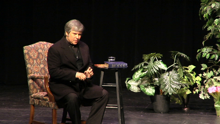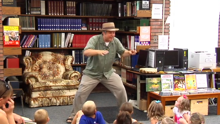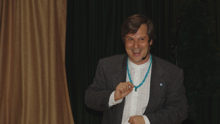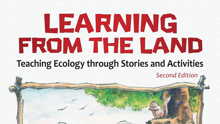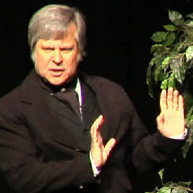
A River of Stories:
Stories Create A Link to the Past & A Brighter Future
By Brian “Fox” Ellis ©
“Please, I invite you to contemplate an entangled stream bank, clothed with many plants of many kinds, there are birds singing in the high branches, a multitude of insects flitting about, worms crawling through the damp earth, and this river cuts through layers of fossil plants and ancient sea beds… reflect with me on these elaborately constructed forms, all have been produced by the laws of nature acting around us…There is a grandeur in this view of life, Power breathed into a few forms or maybe just one, and while this planet has gone on cycling according to the fixed laws of gravity, From so simple a beginning, endless forms most beautiful and most wonderful have been and are still being evolved.” Charles Darwin
These are the last few sentences of Darwin’s most famous book, On the Origin of Species. Darwin is one of several historical scientists that I portray. This quote is a truly brilliant invitation to imagine your local river as a journey through the earth’s ancient story from the dawn of time, to the creation of life on this planet, continuing on through to this vary day and the life that inhabits your river this afternoon.
Let us continue this journey through time.
Who has lived along the shores of your river in the past several hundred or thousands of years? Stories allow us to travel through time and meet the folks of not so long ago, not so far away! What are the stories of your homeland? How can these stories help you feel a deeper sense of place? How can these stories of how things once were help us imagine how they might be yet again?
On the Illinois and Mississippi Rivers, where I work each summer as the Riverlorian, or resident historian, on the Spirit of Peoria riverboat:
- We have 10,000 years of American Indian history.
- Three hundred years ago we saw the first French Explorers.
- The British chased out the French about 200 years ago.
- And then the American Colonists flooded over the mountains to clear-cut the forests and plow up the prairies.
- Industry grew, as did some of the largest cities in America from Chicago to St. Louis, Minneapolis to New Orleans.
Through all of this, the river was an important source of raw materials, drinking water, food and transportation. The river was, and still is, the source of life.
Take a moment and make a quick sketch of your local river. Turn this map into a time line and make note of the various layers of history, note both geological and human landmarks still visible today.
Several years ago I was commissioned by a local environmental education organization, The Sun Foundation, to create a stage show, that later became a fake-documentary. We used stories to not only help folks connect to the history of the river, but more importantly, we looked at the history of environmental problems in a way that inspired the audience to be proactive, to make a difference within their ecological community.
 Because of my work for the Spirit of Peoria riverboat, I had already interviewed dozens of people who depend on the river for their livelihood, from tug boat captains to commercial fishermen, duck hunters to bird watchers. I turned these oral histories into comedy and then hired three storytellers to portray several characters each, adding another element of humor. In a fast-paced, TV newscast format, geared towards teens, each character told their story of their relationship to the river. They ended with concrete suggestions of things anyone could do to make a difference. Because one of my life-goals is to give voice to the wild world, I also included a poem about a whooping crane and a song from the point of view of a catfish!
Because of my work for the Spirit of Peoria riverboat, I had already interviewed dozens of people who depend on the river for their livelihood, from tug boat captains to commercial fishermen, duck hunters to bird watchers. I turned these oral histories into comedy and then hired three storytellers to portray several characters each, adding another element of humor. In a fast-paced, TV newscast format, geared towards teens, each character told their story of their relationship to the river. They ended with concrete suggestions of things anyone could do to make a difference. Because one of my life-goals is to give voice to the wild world, I also included a poem about a whooping crane and a song from the point of view of a catfish!The video later won awards and a grant that allowed me to give a free copy, with lesson plans, to every school in the Illinois River Valley.
I share this short story as an example of the power of storytelling to not only help folks feel more connected to a deeper sense of place, but also as an invitation for you to use storytelling to imagine a healthier future.
I invite you to:
- Interview the folks who work and live along your local river;
- Translate these stories into literature, performance material, poetry and song;
- Share these stories in print, on-line, in video, or live performances;
- And within these stories create an invitation for listeners to make a difference.
As I ask each of the people I interviewed: What are the ecological issues in your community? What is the history of the problem? What are some concrete, simple steps we can take that will help make a difference?
Because of this work with The Sun Foundation, students are not only planting trees, restoring prairies, and picking up trash, but a handful of more ambitious students are now raising endangered alligator snapping turtles in the classroom to release them into the wild. They have initiated a recycling program, P2D2, that collects prescription medicines, then incinerates them to create electricity, keeping the drugs out of our waterways. And other students are testing hundreds of tributaries each spring for Atrazine, a very harmful pesticide. Many of these students have shared their stories in a way that has motivated student groups around the country and around the world to replicate their efforts.
It all begins with a story.
As folks are immersed in the stories of their local history and ecology, the powerful sense of connection is palpable. Stories make the abstract ideas of science and history personal and intimate. Stories, like a river, can invite listeners to travel through time and help them imagine a better future.
VIDEOS
Over view of the video Voices for the River
Over view of the video Voices for the River
https://www.youtube.com/watch?v=fDvLByUGJM8
River Stories
http://www.foxtalesint.com/images/pdf/riverstories.pdf
Walter the Water Molecule
Sun Foundation
http://sunfoundation.org/wordpress/
Spirit of Peoria
https://p2d2program.wordpress.com/about/history/
Operation Endangered Species
http://operationendangeredspecies.com
